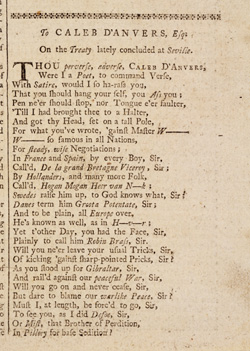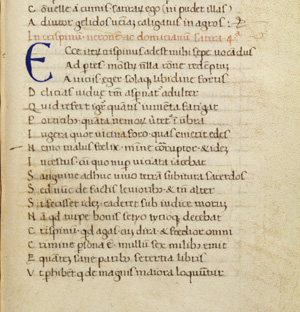| |
 |
| Part of a poem from The craftsman, No.
185, January 1730. ‘W–––’ is Robert
Walpole, ‘N–––k’ is Norfolk, his home
county, and H––v––r is Hanover. Daniel Defoe
and Nathaniel Mist both stood in the pillory after convictions for
libel. From NPR.Misc. (Printed document not on display.) |
It has sometimes been suggested that poetry is too pure
or unworldly an art to engage in politics. Nevertheless, whether writing
scurrilous doggerel, more elaborate satirical essays on human folly, or
works of dignified and elegiac protest, poets have long intervened in
public life. Much of the verse dashed off to land blows in debate is of
negligible literary merit, but the compassion which can underlie strong
political feeling has occasionally given rise to major works. The thousands
of metrical squibs printed in the furtherance of factional party wrangling
show that verse has been seen as an effective weapon by its practitioners,
and in some societies the very act of writing poetry has assumed a political
dimension, as a form of dissent from state control.
Items on display:
MS Cholmondeley (Houghton) 74/20, 24 and 49:
three poems against Robert Walpole, seized by government agents from the
printing shop of Richard Francklin, examined by censors and docketed ‘Scrutore
3 Sept 1730’. MS Add. 8487/4: Siegfried
Sassoon, ‘Glory of women’, 1917.
|
